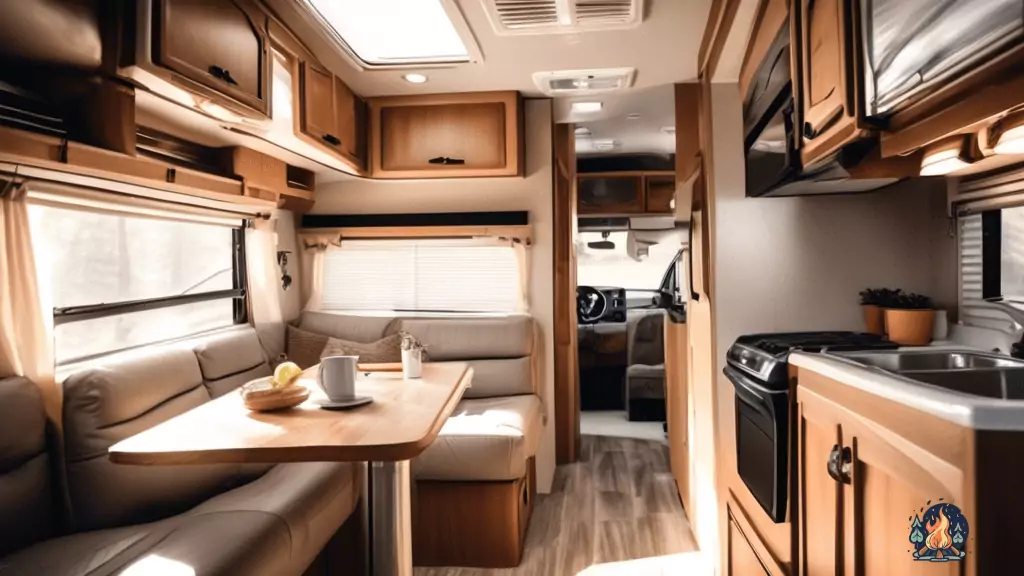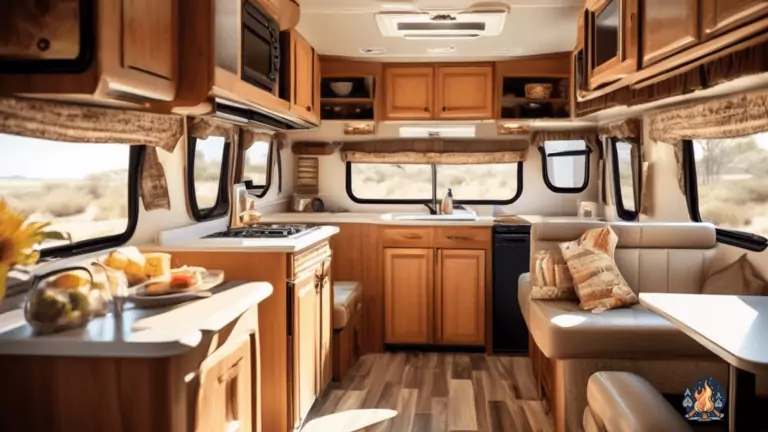Common Issues With RV Air Conditioning And How To Troubleshoot
by Kevin Fairbanks • Updated: January 21, 2024
Having trouble with your RV air conditioning? Learn how to troubleshoot common issues and stay cool on the road. Click here for simple tips and tricks to keep your RV AC running smoothly.

Are you ready to hit the road in your RV and enjoy the ultimate adventure? Before you embark on your journey, it’s crucial to ensure that your RV air conditioning is in top-notch condition. After all, there’s nothing worse than being on the road, sweltering in the heat, and realizing that your AC isn’t working properly.
But fear not, fellow traveler! In this article, we will guide you through the common issues with RV air conditioning and provide you with troubleshooting tips to keep you cool and comfortable on your road trip.
Picture this: you’re cruising down the highway, the wind in your hair, and the sun shining brightly. But wait, something’s not right. You start to feel the heat creeping in, and your RV suddenly feels like a sauna on wheels. What could be the problem? Don’t panic! We’ve got your back.
In this article, we’ll tackle the most common issues with RV air conditioning and show you how to troubleshoot them like a pro. From lack of cooling to poor air circulation, strange noises to water leaks, and even electrical problems, we’ll cover it all.
So sit back, relax, and get ready to beat the heat with our handy troubleshooting guide.
Key Takeaways
- Ensuring that the RV air conditioning is in top-notch condition is crucial before embarking on a journey.
- Common issues with RV air conditioning include lack of cooling, weak airflow, strange noises, water leaks, and electrical problems.
- Troubleshooting tips for these issues include checking temperature settings, cleaning or replacing air filters, clearing obstructions for airflow, inspecting fan blades, diagnosing and fixing unusual sounds, unclogging drain line for water leaks, and checking power source and wiring for electrical problems.
- If unsure or uncomfortable with troubleshooting, it is important to seek professional help.
No Cold Air: Troubleshooting Lack of Cooling
If your RV’s air conditioning is not producing cold air, there are a few troubleshooting steps you can take to address the lack of cooling. First, make sure the temperature is actually set to a cool setting. I know, I know, it sounds obvious, but you’d be surprised how many people panic and call for help only to find out they accidentally had the temperature turned up to sauna levels.
So, double-check that thermostat and make sure it’s set to a temperature that won’t have you sweating like a polar bear in the desert.
If the temperature is set properly and you’re still not feeling that refreshing blast of cool air, it’s time to check the air filter. A clogged air filter can seriously hinder the airflow and make your air conditioner work harder than a squirrel trying to crack open a coconut.
So, locate the air filter and give it a good cleaning or replace it if necessary. Trust me, your air conditioner will thank you and you’ll be back to enjoying that icy coolness in no time.
Remember, troubleshooting your RV’s air conditioning can be a breeze if you follow these simple steps. So, don’t let the lack of cold air bring you down, because with a little bit of humor and some handy troubleshooting, you’ll be chilling out in no time.
Weak Airflow: Addressing Poor Air Circulation
To combat the feeble airflow in your RV, you’ll want to channel your inner superhero and unleash the mighty forces of air circulation.
You see, weak airflow is like a villain that sneaks into your RV and steals away your comfort. But fear not, for you possess the power to defeat this nefarious enemy.
First, check your air filters. Dirty filters can clog up the airflow, so give them a good cleaning or replace them if necessary. Think of it as giving your air conditioning system a much-needed spa day.
Next, take a look at your vents. Are they open and unobstructed? Sometimes, they can get blocked by furniture, curtains, or even the occasional superhero cape. Clear away anything that might be hindering the airflow and let that cool air flow freely once again.
Now, let’s talk about the fan speed. Are you using the right setting? If you’re stuck on low, it’s time to kick it up a notch. Increase the fan speed and let it blow with all its might. Just be careful not to create a tornado inside your RV.
And speaking of fans, don’t forget to check the fan blades. Dust and debris can accumulate over time, causing them to spin less efficiently. Give them a gentle wipe-down and watch as they spin with renewed vigor.
Finally, make sure your air conditioning unit is the appropriate size for your RV. If it’s too small, it may struggle to provide adequate airflow. Consider upgrading to a larger unit if necessary.
With these tips in your superhero arsenal, you’ll be able to defeat the weak airflow villain and restore balance to your RV’s air conditioning system.
Strange Noises: Diagnosing and Fixing Unusual Sounds
Unusual sounds coming from your RV’s air conditioning can be a cause for concern, but fear not, there are simple ways to diagnose and fix them. Here are a few steps to help you get to the bottom of those strange noises:
- Listen closely: Start by turning off any other noisy appliances or distractions and listen carefully to the sound your air conditioning unit is making. Is it a rattling, banging, or squealing noise? Identifying the type of sound can give you a clue about what might be causing it.
- Inspect the fan: One common culprit for strange noises is a loose or damaged fan. Check for any loose blades or debris stuck in the fan. If you spot any issues, tighten the screws or remove the debris to see if that solves the problem.
- Check the compressor: Another possible source of noise is a faulty compressor. If you hear a humming or buzzing noise, it could indicate that the compressor is struggling or not functioning properly. In this case, it’s best to call a professional for further inspection and repair.
- Clean the air filters: Blocked or dirty air filters can also contribute to unusual sounds. Remove the filters and clean them thoroughly, removing any dirt or debris. Reinstall the filters and see if the noise dissipates.
Remember, when it comes to fixing strange noises in your RV’s air conditioning, it’s always best to err on the side of caution. If you’re unsure about how to proceed or the noise persists after troubleshooting, don’t hesitate to seek professional help.
Happy RVing, and may your air conditioning be as quiet as a mouse!
Water Leaks: Identifying and Resolving Leakage Issues
Imagine you’re enjoying a relaxing trip in your RV, only to discover a mysterious water leak that threatens to dampen your spirits and ruin your vacation – fear not, we’ve got the inside scoop on identifying and resolving these sneaky leakage issues!
First things first, you need to track down the source of the leak. It could be coming from a variety of places, such as the air conditioner itself, the roof, or even the plumbing system. So put on your detective hat and start investigating!
If you notice water dripping from the ceiling near the air conditioner, it’s likely that the drain line is clogged. This can happen due to debris or algae buildup, preventing the water from properly draining. Grab a flashlight and take a look at the drain pan beneath the air conditioner unit. If it’s filled with water, you’ve found the culprit! Simply unclog the drain line by using a wet/dry vacuum or a pipe cleaner to remove any obstructions.
If the leak is coming from the roof, it could be due to a damaged or improperly sealed roof vent or air conditioner gasket. Check for any cracks or gaps in these areas and apply a suitable sealant to prevent further leaks. Don’t forget to inspect the plumbing system as well, as a faulty connection or damaged pipe can also lead to water leakage. Tighten any loose connections and replace any damaged components to ensure a watertight system.
Remember, water leaks can be sneaky and frustrating, but with a little detective work and some handy solutions, you’ll be back to enjoying your RV adventures in no time. So put on your detective hat, grab your tools, and get ready to conquer those leaks like a true RV hero!
Electrical Problems: Solving AC Power and Wiring Troubles
Experiencing electrical problems with your RV’s air conditioning can be frustrating, but there are ways to troubleshoot and solve AC power and wiring troubles. Here are some tips to help you get started:
- Check the power source: Make sure your RV is properly connected to a reliable power source.
- Sometimes, the issue can be as simple as a tripped circuit breaker or a blown fuse. So, before diving into more complex troubleshooting, double-check your power source and ensure it is functioning correctly.
- Inspect the wiring: Take a look at the wiring connections in your RV’s air conditioning system.
- Loose or damaged wires can lead to power issues.
- Give the wiring a thorough inspection and tighten any loose connections.
- If you notice any frayed or damaged wires, it’s best to replace them to avoid further problems.
- Test the thermostat: The thermostat plays a crucial role in controlling the AC power and temperature.
- If you’re experiencing problems, check the thermostat settings and make sure it’s functioning correctly.
- You can also try resetting the thermostat to see if that resolves the issue.
- If the problem persists, it may be necessary to replace the thermostat.
Remember, electrical problems can be tricky to diagnose and fix, so don’t hesitate to seek professional help if you’re unsure or uncomfortable with troubleshooting on your own. And if all else fails, just remember that sometimes a little humor can go a long way in dealing with these frustrating issues.
Frequently Asked Questions
How can I prevent my RV air conditioning unit from producing no cold air?
To prevent your RV AC unit from producing no cold air, check if the thermostat is set to a low temperature, ensure the compressor is running, clean or replace the air filter, and inspect for any refrigerant leaks. Keep cool and happy camping!
What should I do if my RV air conditioning unit has weak airflow but is still producing cold air?
If your RV’s AC has weak airflow but still blows cold air, it’s like having a marathon runner with tiny lungs. Check the air filters, clean the vents, and ensure good insulation to let that cool breeze flow freely.
Why does my RV air conditioning unit make strange noises even when it’s functioning properly?
Does your RV air conditioning unit sound like a malfunctioning spaceship? Don’t worry, it’s probably just a case of noisy fan blades or loose parts. Get your intergalactic orchestra of tools ready and tighten those screws!
How can I determine the source of a water leak in my RV air conditioning unit?
To find the source of a water leak in your RV air conditioning unit, grab your detective hat! Did you know that water leaks account for 90% of AC system failures in RVs? Let’s track down that culprit!
What safety precautions should I take when troubleshooting electrical problems in my RV air conditioning unit?
When troubleshooting electrical problems in your RV air conditioning unit, safety is key! Make sure to turn off the power, wear protective gear, and keep a fire extinguisher nearby. Let’s keep the sparks flying in the right direction, shall we?

Hi, I’m Kevin, a lifelong camping enthusiast and the voice behind Campfire Discoveries. From tent to RV to cabin camping, I’ve explored it all. Join me as we share stories and tips around the campfire, deepening our connection with the great outdoors.
Keep Reading
-
Common Issues With RV Batteries And How To Troubleshoot
Having trouble with your RV battery? Learn how to troubleshoot common issues and hit the road worry-free! Click now for expert tips on RV battery troubleshooting.
-
Choosing The Right Camping Tent For Your Adventure
Find the Perfect Camping Tent for Your Adventure – Cozy or Spacious, Discover Your Ideal Shelter Today! Don’t Miss Out!
-
Quick And Delicious RV Lunch Ideas For Easy Meal Prep
Fuel your adventures with these quick and easy RV lunch ideas! Discover mouthwatering recipes for on-the-go meals that are perfect for meal prep. Don’t miss out on these delicious and convenient options – click here to get inspired now!



